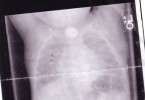Be warned— these pictures are disturbing, but they are an important reminder to be careful when applying bug spray this summer.
As Mark Marchesky writes in a Facebook post, his experience serves as a warning not to use bug spray near a campfire— or any open flame.
Image Credit: Facebook
Marchesky states that he was just looking to burn some brush on his farm when he decided to stave off the hordes of mosquitoes by spraying on some bug repellent before going out to light the fire. However, even though he wasn’t spraying himself next to the open flame, the application was still recent enough to have a painful result.
As Marchesky lit the fire, a flash of flame covered his legs as well.
“A quick flash of the torch ignited both the brush and instantly a flash of flame to both my legs,” wrote Marchesky, “it happened so quickly, as I ran patting the burning flesh off my legs I reached a garden hose on a nearby outbuilding and began flushing my legs for about 20 minutes to ease the pain.”
A trip to the ER rapidly followed where the remaining burned flesh was stripped off, his legs were wrapped, and bacitracin applied. He was then referred to the Burn Unit for further treatment and now faces another week in antibiotic wraps.
Image Credit: Facebook
As Marchesky notes, the process wasn’t a pleasant one.
“Painful- yes!!!!, with no pain meds given, my kids heard my muffled school girl screams from my the treatment room down the hall,” he wrote.
Hoping that others will learn from his example, he cautions people to give any insect repellent plenty of time to dry after application before going near an open flame. Check the product for further details, but wait at least five minutes.
Image Credit: Facebook
In addition, the CDC warns against applying bug spray over cuts, wounds, or irritated skin and to use only enough to cover exposed areas and/or clothing.
Don’t spray repellent on your face— if it’s necessary to apply it to the face, ears, or neck, spray it on your hands, then use your hands to apply it.
Young children — who often put their hands in their mouth — should not have bug spray applied to their hands, and everyone (child and adult) should wash off the repellent (and wash affected clothing) once indoors again.
With summer in full swing, Marchesky unfortunate experience is a helpful safety reminder for enjoying the outdoors, safely and bug-free.










